Bleeding Hemorrhoids: How do You Treat Them?
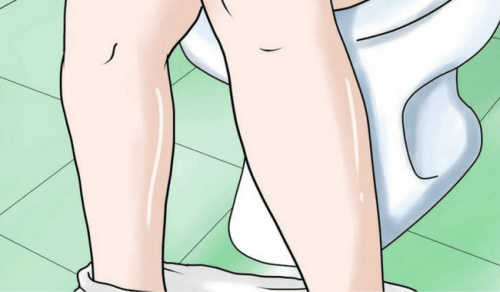
Hemorrhoids are very annoying and painful. This is especially true if they bleed. You might not have known, but a large percentage of the population has this problem, or will get it at some point in their life. This is especially true of women after giving birth or after the age of 35. Do you want to learn the best natural treatments for bleeding hemorrhoids? Keep reading!
Treatment options for bleeding hemorrhoids
Most of the time, blood in your stool or drops of blood in your underwear only lasts a few hours or days. Still dealing with this is extremely unpleasant, uncomfortable, and painful.
The itching can become unbearable. This is usually what leads people to look for remedies or treatments that can help them reduce the symptoms. Here’s our advice for speeding up the healing process for bleeding hemorrhoids:
Drink a lot of water
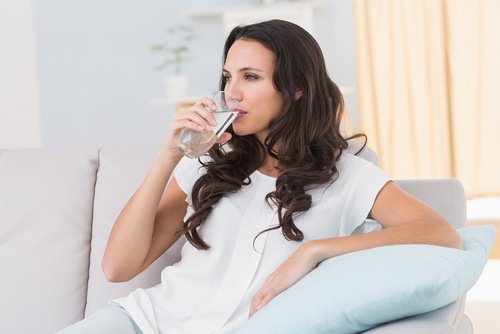
This doesn’t just help your urine get rid of waste and toxins, it also helps soften your stool. Plus, water makes your fecal matter move through your intestines more quickly because it lubricates the intestinal walls.
It’s worth remembering that hard, dry stool irritates and scratches the hemorrhoid tissue. This can cause further pain and bleeding.
This is why we recommend that you drink at least 8 glasses of water per day. If you aren’t a big fan of water, you can drink it in the form of natural juices or teas. Soft drinks, coffee, or alcoholic beverages don’t count.
Avoid constipation
Not being able to go to the bathroom and having hemorrhoids is not a good combination. Your diet should include a good amount of whole grains, nuts, raisins, and leafy greens like spinach.
Learn more: 6 Whole Grains that You Should Have in Your Diet
This way you’ll prevent constipation and won’t be in pain when you go to the bathroom.
The worst thing that can happen when you have bleeding hemorrhoids is constipation. Having to use all that extra effort when you go to the bathroom doesn’t make things any easier.
Take the time you need to relieve yourself. And remember, putting too much pressure on your rectal canal can cause more harm if you have bleeding hemorrhoids.
Don’t suppress your urge to use the bathroom
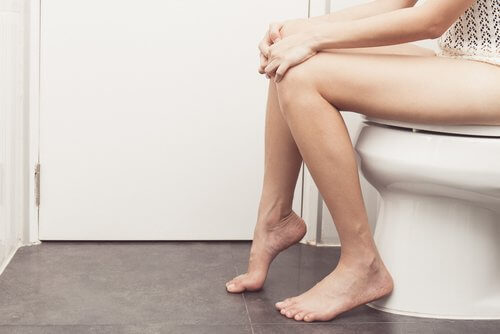
Many people think it’s better to hold their stool in or reduce the number of times they use the restroom. The idea is that this helps them heal more quickly and stop bleeding. Unfortunately, that’s not the case.
The reason is simple: when you accumulate more waste in your body, it’s harder to get rid of it without pain or discomfort. It’s also not good for you. You end up keeping toxins in your body. These can then cause diseases.
You’re in a lot of pain because of the hemorrhoids, but you need to be brave and go to the bathroom. If you put it off, it just ends up being more unpleasant and painful. It will take longer to heal, and you’ll be more likely to start bleeding again.
Reduce the amount of harmful foods you eat
Salt is one of the worst enemies for hemorrhoids because it causes fluid retention.
What’s the relationship between hemorrhoids and swelling? Your body swells due to the accumulation of water, which causes the blood vessels in your rectal canal to become inflamed.
The consequence is bleeding, pain, and discomfort when going to the bathroom or sitting.
We also recommend reducing the amount of coffee, alcohol, chocolates, fatty foods, sugary foods, and white flours you eat. All of these foods produce harder, dryer stool, which is more difficult to get rid of without feeling any pain.
Read more: Four Foods That You Should Avoid in Any Diet to Lose Weight
But, if you maintain a balanced diet, you can help the problem get better much more easily. This isn’t just when you have bleeding hemorrhoids, either, it’s true all the time. Your diet should include lots of fresh fruits and vegetables.
Try to make sure your diet includes all the major food groups.
Ensure personal hygiene
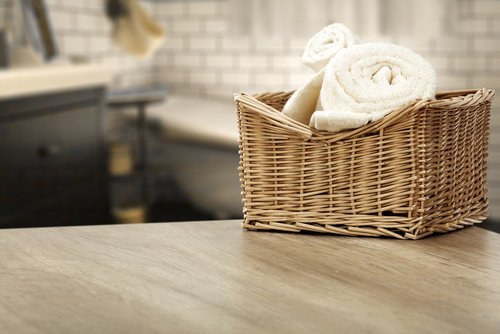
Bleeding hemorrhoids make the burning worse and are more likely to become infected. Every time you use the bathroom, wash yourself with cold or lukewarm water.
Don’t use toilet paper. This irritates the area and can make the bleeding worse. Avoid letting the dry blood stay in the area or your underwear for a long time.
A good way to keep the area clean is to take sitz baths or soaking baths. You just sink this specific area in a container of warm water. Let it soak a few minutes until it relieves the discomfort.
Don’t use a towel to dry yourself off–it has the same effect as toilet paper.
Change your posture
Spending several hours seated isn’t good for your hemorrhoids (whether they bleed or not). If your job demands that you sit in front of a computer all day long, stand up for a few minutes every hour. If you can, walk around a little, even if it’s just around your desk.
This is a good way to increase your blood flow. Doing that keeps blood from accumulating in your rectal area, which could cause increased pain and discomfort.
In case you were wondering, we can’t recommend heavy exercise. We’re talking about things like lifting weights, spinning, and playing tennis. For these situations, more relaxing physical activities are better. This includes things like swimming, yoga, and walking.
Use natural treatments
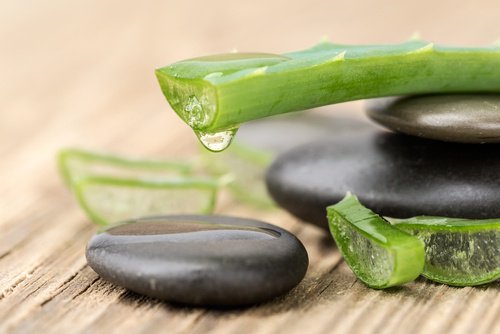
- Aloe is one of the best options at your disposal. Cut one of the plant’s leaves open lengthwise. Take off the spines and place the inside of the leaf on your anus. Make sure the gel is in contact with the hemorrhoids.
You’ll start to feel the relief in just a few minutes.
- Ice is another interesting option. It’s especially good if you have a lot of discomfort or burning. Don’t forget to wrap the ice cube in a cloth so that it’s not in direct contact with your skin.
- When you’re doing a sitz bath, you can also add a tablespoon of Epsom Salts. These help to heal the wound faster.
Main image courtesy of © wikiHow.com
All cited sources were thoroughly reviewed by our team to ensure their quality, reliability, currency, and validity. The bibliography of this article was considered reliable and of academic or scientific accuracy.
- Zindel, J., Inglin, R., & Brügger, L. (2014). [Necessary and unnecessary treatment options for hemorrhoids. Therapeutische Umschau. https://doi.org/10.1024/0040-5930/a000620
- Lopez-Yarto, M., Alonso-Coello, P., Johanson, J. F., Zhuo, Q., Heels-Ansdell, D., Guyatt, G. H., & Mills, E. (2005). Laxatives for the treatment of hemorrhoids. Cochrane Database of Systematic Reviews. https://doi.org/10.1002/14651858.cd004649.pub2
- Lohsiriwat, V. (2012). Hemorrhoids: From basic pathophysiology to clinical management. World Journal of Gastroenterology. https://doi.org/10.3748/wjg.v18.i17.2009
This text is provided for informational purposes only and does not replace consultation with a professional. If in doubt, consult your specialist.








